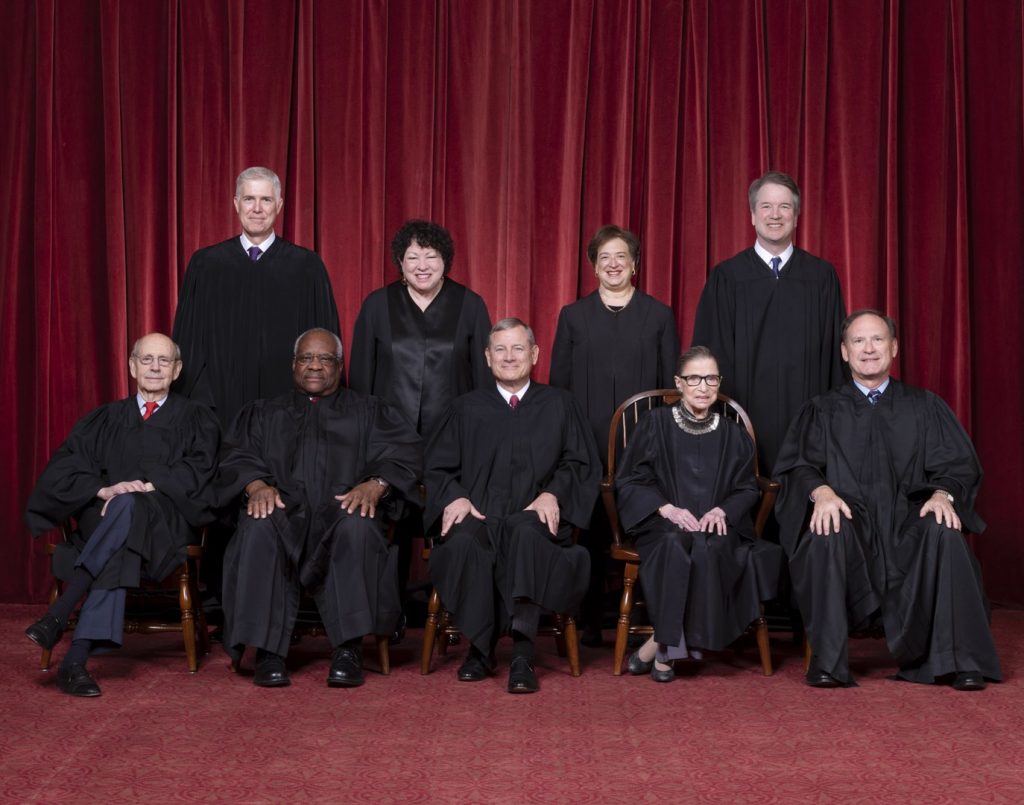
(Photograph by Fred Schilling, Supreme Court Curator’s Office, Public Domain)
In May, New York City repealed its singularly strict license, permit and transportation gun laws, despite lawmakers’ overwhelming support for them in the past.
Albany legislators promised never to reinstate such ordinances in New York State, which has more permissive laws than then in New York City.
Lawmakers’ surrender of their gun control laws is a desperate effort to moot–or eliminate–the NRA’s dangerous Supreme Court challenge, New York State Rifle and Gun Association v. City of New York, that could federally weaken gun-carry laws at a time when 53 people died in August alone in mass shootings.
For the last decade, the Court has turned away multiple Second Amendment cases, leaving them to the lower courts and the states and municipalities, that is, until Justice Brett Kavanaugh–who believes the right to bear arms is tantamount to a broad right to travel with them–replaced the more moderate Anthony Kennedy on the Court last October.
Muting Tactics a Subterfuge
The NRA’s attorney, Paul Clement, former Solicitor General and Kirkland & Ellis partner, who represented North Carolina’s winning 5-4 gerrymandering case last term, dismissed the mooting maneuver.
However, the nine Justices, not Paul Clement, will decide whether to moot the case during their October 1st conference.
If the Justices decide not to moot the case, they will review “whether New York City’s ban on transporting a licensed, locked, and unloaded handgun to a home or shooting range outside city limits is consistent with the Second Amendment, the Commerce Clause and the Constitutional right to travel.”
Sheldon Whitehouse’s Amicus Brief
“Enter five Democratic Senators, who on August 12th filed an unusual (shall we say) amicus brief,” writes Garrett Epps in The Altantic.
Written by Senator Sheldon Whitehouse of Rhode Island, the brief, also penned by Richard Blumenthal of Connecticut, Dick Durbin of Illinois, Kirsten Gillibrand of New York, and Mazie Hirono of Hawaii, asked the Court to dismiss the case.
Epps writes, “ the brief launched into a freewheeling discussion of recent politics surrounding the Court: the Republican blockade that kept Justice Antonin Scalia’s seat open for a year [after Senator Majority Leader Mitch McConnell, refused to confirm Merrick Garland]; ….the involvement of the National Rifle Association and the Federalist Society in judicial selection once Donald Trump took office; the flow of ‘dark money’ into advocacy groups such as the Judicial Confirmation Network for advertisements supporting the nominees Neil Gorsuch and Kavanaugh; the long string of 5–4 decisions favoring Republican and conservative causes and splitting the Court on precisely partisan lines; and recent poll numbers showing that more and more Americans believe (in the words of one poll) that the Court “should be restructured in order to reduce the influence of politics,”
“The Supreme Court is not well. And the people know it.
“Perhaps the Court can heal itself before the public demands it be restructured in order to reduce the influence of politics. Particularly on the urgent issue of gun control, a nation desperately needs it to heal,” the Senators’ brief concludes.
Even the Washington Post columnists balked at Democratic Senators’ court-packing threat, pointing out FDR’s bungled attempt to pack the Court with New Deal supporters.
Republican Senators Fight Back
In late August, all 53 Republican Senators signed a letter urging the Supreme Court to ignore the “amicus curiae brief from five Democrat Senators that threatened the High court with restructuring if it did not rule the way those Senators wished, NRA-ILA Institute for Legislative Action reported.
“Amicus briefs by members of the legislative branch are not uncommon, but those briefs always treat the Court with the respect it deserves as a coequal branch of government.
“Threatening the Court if it doesn’t rule their way is certainly a new approach for amici to take in attempting to persuade the Court,” the Republican Senators wrote.
Meanwhile, Mitch McConnell has promised to disregard his own election year rule preventing the Senate from confirming Merrick Garland during President Obama’s lame duck year, and appoint another Trump Justice, if there’s a vacancy, The Atlantic’s Garrett Epps writes.



Leave a Comment